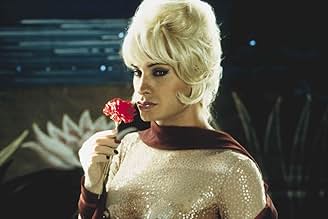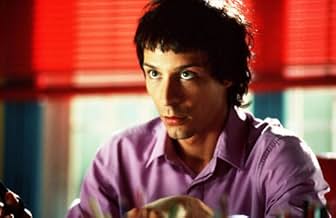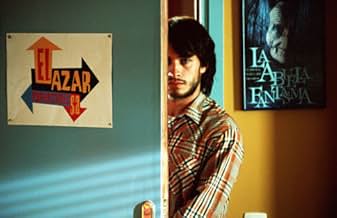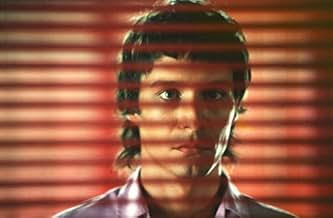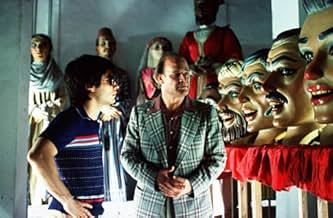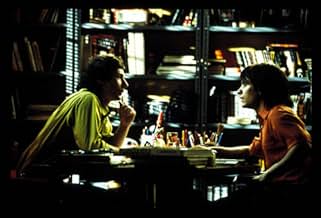AVALIAÇÃO DA IMDb
7,4/10
65 mil
SUA AVALIAÇÃO
Uma análise sobre o impacto do ensino religioso franquista e de seus abusos sexuais sobre dois amigos de infância.Uma análise sobre o impacto do ensino religioso franquista e de seus abusos sexuais sobre dois amigos de infância.Uma análise sobre o impacto do ensino religioso franquista e de seus abusos sexuais sobre dois amigos de infância.
- Indicado para 1 prêmio BAFTA
- 16 vitórias e 42 indicações no total
Nacho Pérez
- Ignacio
- (as Ignacio Pérez)
Raúl García Forneiro
- Enrique
- (as Raúl Gª Forneiro)
Agustín Almodóvar
- Limpiador Piscina
- (não creditado)
Pedro Almodóvar
- Limpiador Piscina
- (não creditado)
Robert Forcadell
- Man in public
- (não creditado)
Luis Lobos Negros
- Motero ochentero
- (não creditado)
Avaliações em destaque
Spoilers
Since 'Hable con ella' ('Talk to her', for which my summary line was 'Almodovar mellowing?') which some consider Almodovar's best, his fans have been looking forward to his next one with great expectation but also some apprehension as to how could he possibly tope it, in the sheer ingenious creativity, if nothing else. Bound for Cannes release, Bad Education soon demonstrated that the apprehension is not unfounded. It is, after all, not easy to surpass the achievement of Hanle con ella. Undoubtedly still Almodovar, Bad Education however is Almodovar melodrama, a little short of Almodovar masterpiece.
The film opens with attention grabbing, definitive music (regardless of what mood) that is Almodovar's hallmark. Similarly, we see the inimitable Almodovar feuding colours. Homosexuality and fetishism you'll almost always expect in an Almodovar film but there is less extreme perversity and violence compared with some of his other pictures.
And here comes the plot. The story of the young altar boys is told in a manuscript of a book entitled 'The Visit', which is used by one of the grown-up boys Ignacio, now a transvestite called Zahara, as a tool for blackmailing Father Manolo. But wait, all this is just in a screenplay. The story of Father Manolo and the altar boys however is real. The real Ignacio is the screenplay writer, who is trying to get Enrique the film director, another grown-up altar boy, to produce the film. But wait again, Ignacio doesn't want to be called Ignacio, claiming that he is now a fully transformed person called Angel, an actor trying very hard to get to play the part Zahara. Having fun yet? There's more. Enrique becomes suspicious if Ignacio/Angel is really the Ignacio he knew as a kid, and embarks on an investigation. Meanwhile, Father Monolo jumps out of the screenplay, materialising as a real person. And all these stories within stories are told jumping back and forth between past and present, fiction and reality. Enough? There's more, a lot more.
In the end, Bad Education, while enormously entertaining, stops at being just that instead of moving further into the realm of depth of emotion and breadth of creativity we see in Talk to Her and All About Mother. However, in addition to the entertainment, there is one particularly bright spot, one Gael Garcia Bernal (playing Angel and all the rest of them) who first served notice in the brilliant Mexican film Amores perros (2000) that he has to be reckoned with. I just can't wait to see him play Cuban revolutionary icon 'Che' Geuvara in Motorcycle Diaries (2004).
Since 'Hable con ella' ('Talk to her', for which my summary line was 'Almodovar mellowing?') which some consider Almodovar's best, his fans have been looking forward to his next one with great expectation but also some apprehension as to how could he possibly tope it, in the sheer ingenious creativity, if nothing else. Bound for Cannes release, Bad Education soon demonstrated that the apprehension is not unfounded. It is, after all, not easy to surpass the achievement of Hanle con ella. Undoubtedly still Almodovar, Bad Education however is Almodovar melodrama, a little short of Almodovar masterpiece.
The film opens with attention grabbing, definitive music (regardless of what mood) that is Almodovar's hallmark. Similarly, we see the inimitable Almodovar feuding colours. Homosexuality and fetishism you'll almost always expect in an Almodovar film but there is less extreme perversity and violence compared with some of his other pictures.
And here comes the plot. The story of the young altar boys is told in a manuscript of a book entitled 'The Visit', which is used by one of the grown-up boys Ignacio, now a transvestite called Zahara, as a tool for blackmailing Father Manolo. But wait, all this is just in a screenplay. The story of Father Manolo and the altar boys however is real. The real Ignacio is the screenplay writer, who is trying to get Enrique the film director, another grown-up altar boy, to produce the film. But wait again, Ignacio doesn't want to be called Ignacio, claiming that he is now a fully transformed person called Angel, an actor trying very hard to get to play the part Zahara. Having fun yet? There's more. Enrique becomes suspicious if Ignacio/Angel is really the Ignacio he knew as a kid, and embarks on an investigation. Meanwhile, Father Monolo jumps out of the screenplay, materialising as a real person. And all these stories within stories are told jumping back and forth between past and present, fiction and reality. Enough? There's more, a lot more.
In the end, Bad Education, while enormously entertaining, stops at being just that instead of moving further into the realm of depth of emotion and breadth of creativity we see in Talk to Her and All About Mother. However, in addition to the entertainment, there is one particularly bright spot, one Gael Garcia Bernal (playing Angel and all the rest of them) who first served notice in the brilliant Mexican film Amores perros (2000) that he has to be reckoned with. I just can't wait to see him play Cuban revolutionary icon 'Che' Geuvara in Motorcycle Diaries (2004).
This is a difficult film to write about. For one thing, to describe the plot would be to give away the twists and thus spoil its surprises; but for another, it's impossible to take a great work of art and put it into words. That said, here goes:
Truth be told, it was the promise of Gael Garcia Bernal (whom I've loved since "Y Tu Mama Tambien") in drag that piqued my interest in seeing "Bad Education." The only other Almodovar movie I'd seen before this was "Talk to Her," which I was on the fence about, but if Gael Garcia Bernal was involved, I was happy to give Almodovar another shot. (Interestingly, "Bad Education" has given me a new appreciation of "Talk to Her." The two films share a lot of themes -- false identity and self-creation, the willful self-deception and fantasy of falling in love, the spiritualization of aesthetic beauty -- not to mention a hypnotic use of music, an indifferent attitude towards women, and a few actors I recognized.)
Almodovar's genius in both "Bad Education" and "Talk to Her" is his ability to set the scene, stringing the audience along, lulling it into a sense of comprehension and security, and then suddenly turning the tables with a twist of such dizzying magnitude that the mind, reeling, forced to give up on trying to understand, must just relax and allow the movie to take over -- miraculously, all without leaving the audience feeling manipulated. In "Bad Education," he takes this device to breathless, upper-atmospherical levels, for with each twist, the film takes on a new genre.
It begins as a tender coming-of-age story, interspersed with boarding-school flashbacks reminiscent of such French fare as Louis Malle's "Au revoir, les enfants" and François Truffaut's "L'argent de pôche," although I sensed a lot of Fellini in the mod outfits, feathery hairstyles, and picturesque bicycle-strewn streets. Probably the most romantic segment of the film, it alludes even to "Breakfast at Tiffany's" (Henry Mancini's "Moon River" hasn't been employed so creatively since last year's "Angels in America"). Indeed, the performances are so endearing, the cinematography so warm and luminous, that this segment of "Bad Education" could easily exist as its own self-contained movie. I was fully prepared to embrace it and love it as a sincere period romance.
But without warning, the film turns itself upside down and becomes an exhilarating meta-commentary in the vein of Charlie Kaufman's "Adaptation" (complete with crocodiles). Romance turns to farce and tragedy to comedy as the self-consciously cinematic style gives way to the silliness of a movie-within-a-movie.
Unlike "Adaptation," though, "Bad Education" goes on, and in this way it retains its heart and soul. Further twists are introduced, and the movie metamorphoses into a mystery, a thriller, a dark rain-soaked noir -- by the end, I felt as though I had just lived through a hundred years of cinema history, all condensed into less than two rich, glorious hours.
So what holds it all together? The answer is Gael Garcia Bernal. He is a true movie star -- divinely beautiful, dazzlingly charismatic, with that all-important aura of mystery -- and though he virtually plays five characters as his character transforms along with the film, his strikingly calm blue-green eyes and sensual mouth provide a steady center for the madness around him. Despite the rumors of his abusive treatment on set at the hands of Almodovar, Garcia Bernal has a dignity (without which "Bad Education" would collapse under the weight of its own intelligence) that no amount of makeup, wigs, dresses, induced anorexia, or fake Spanish lisping can mask.
"Bad Education" was one of the most intense movie-going experiences I've ever had, and if its future doesn't hold critical acclaim and recognition as a classic, then there's no justice in the world.
Truth be told, it was the promise of Gael Garcia Bernal (whom I've loved since "Y Tu Mama Tambien") in drag that piqued my interest in seeing "Bad Education." The only other Almodovar movie I'd seen before this was "Talk to Her," which I was on the fence about, but if Gael Garcia Bernal was involved, I was happy to give Almodovar another shot. (Interestingly, "Bad Education" has given me a new appreciation of "Talk to Her." The two films share a lot of themes -- false identity and self-creation, the willful self-deception and fantasy of falling in love, the spiritualization of aesthetic beauty -- not to mention a hypnotic use of music, an indifferent attitude towards women, and a few actors I recognized.)
Almodovar's genius in both "Bad Education" and "Talk to Her" is his ability to set the scene, stringing the audience along, lulling it into a sense of comprehension and security, and then suddenly turning the tables with a twist of such dizzying magnitude that the mind, reeling, forced to give up on trying to understand, must just relax and allow the movie to take over -- miraculously, all without leaving the audience feeling manipulated. In "Bad Education," he takes this device to breathless, upper-atmospherical levels, for with each twist, the film takes on a new genre.
It begins as a tender coming-of-age story, interspersed with boarding-school flashbacks reminiscent of such French fare as Louis Malle's "Au revoir, les enfants" and François Truffaut's "L'argent de pôche," although I sensed a lot of Fellini in the mod outfits, feathery hairstyles, and picturesque bicycle-strewn streets. Probably the most romantic segment of the film, it alludes even to "Breakfast at Tiffany's" (Henry Mancini's "Moon River" hasn't been employed so creatively since last year's "Angels in America"). Indeed, the performances are so endearing, the cinematography so warm and luminous, that this segment of "Bad Education" could easily exist as its own self-contained movie. I was fully prepared to embrace it and love it as a sincere period romance.
But without warning, the film turns itself upside down and becomes an exhilarating meta-commentary in the vein of Charlie Kaufman's "Adaptation" (complete with crocodiles). Romance turns to farce and tragedy to comedy as the self-consciously cinematic style gives way to the silliness of a movie-within-a-movie.
Unlike "Adaptation," though, "Bad Education" goes on, and in this way it retains its heart and soul. Further twists are introduced, and the movie metamorphoses into a mystery, a thriller, a dark rain-soaked noir -- by the end, I felt as though I had just lived through a hundred years of cinema history, all condensed into less than two rich, glorious hours.
So what holds it all together? The answer is Gael Garcia Bernal. He is a true movie star -- divinely beautiful, dazzlingly charismatic, with that all-important aura of mystery -- and though he virtually plays five characters as his character transforms along with the film, his strikingly calm blue-green eyes and sensual mouth provide a steady center for the madness around him. Despite the rumors of his abusive treatment on set at the hands of Almodovar, Garcia Bernal has a dignity (without which "Bad Education" would collapse under the weight of its own intelligence) that no amount of makeup, wigs, dresses, induced anorexia, or fake Spanish lisping can mask.
"Bad Education" was one of the most intense movie-going experiences I've ever had, and if its future doesn't hold critical acclaim and recognition as a classic, then there's no justice in the world.
It is a very good film, although not as absolutely great as "Todo sobre my madre" and "Hable con ella"... Maybe because "Mala education" is sadder and darker than the previous Almodòvar films, the theme (the child abuse during college years) is disturbing and depressing, of course.
Almodòvar chooses this time a "noir" story. Enrique, a young movie director, looks for ideas for his next film. By chance he meets Ignacio, an old fellow of the college and his first love. Ignacio gives him a tale written by him, about the sexual abuses on him made by a priest during his childhood, in the college. This will be the inspiration for Enrique's movie, but the director will discover another dramatic truth...
In this film the gay element -which exists in all the Almodòvar's movies- comes back, stronger than in his last films. But above all there's the child rape problem, this is one of the most delicate themes the Spanish director has ever talked about. And naturally "Mala educacion" is one of his most tragic films. Whereas in the previous movies Almodòvar always let a place for hope, with this film it's not the case. That's why it is a very difficult tale to watch.
Cinematography is excellent, the music as well (with many recalls to the Sixties songs). Actors are also very good. For Gael Garcia Bernal (we saw him recently in "Motorcycle diaries") this is another solid effort. He portrays Ignacio, he enters the Almodòvar world with all the ambiguity required.
Almodòvar chooses this time a "noir" story. Enrique, a young movie director, looks for ideas for his next film. By chance he meets Ignacio, an old fellow of the college and his first love. Ignacio gives him a tale written by him, about the sexual abuses on him made by a priest during his childhood, in the college. This will be the inspiration for Enrique's movie, but the director will discover another dramatic truth...
In this film the gay element -which exists in all the Almodòvar's movies- comes back, stronger than in his last films. But above all there's the child rape problem, this is one of the most delicate themes the Spanish director has ever talked about. And naturally "Mala educacion" is one of his most tragic films. Whereas in the previous movies Almodòvar always let a place for hope, with this film it's not the case. That's why it is a very difficult tale to watch.
Cinematography is excellent, the music as well (with many recalls to the Sixties songs). Actors are also very good. For Gael Garcia Bernal (we saw him recently in "Motorcycle diaries") this is another solid effort. He portrays Ignacio, he enters the Almodòvar world with all the ambiguity required.
In "La Mala Educación", Almodóvar is very serious and too dark and tragic, when comparing to his previous movies. There are many usual elements, such as the attack to the Catholic Church, gays, travesties, homosexual intercourse, child abuse etc., but not in his common ironical, colorful and funny way; instead, the story is developed in a very bitter context. The screenplay magnificently discloses the plot, with a story inside another story, mixing "reality" with fiction; the direction of Pedro Almodóvar is excellent as usual; and Gael Garcia Bernal proves his versatility as an outstanding actor. Although being a great film, I do not dare to recommend "La Mala Educación" for any audiences. However, fans like me of this great Spanish director will certainly like it a lot. My vote is eight.
Title (Brazil): "Má Educação" ("Bad Education")
Title (Brazil): "Má Educação" ("Bad Education")
With 'La Mala Educación' Pedro Almodóvar has surpassed himself. It's a very intelligent film with wisely-chosen actors. Gael García Bernal is simply magnificent in portraying three very different characters. This goes to show that he's not only got looks but also a great talent. It couldn't have been easy for him, especially when doing the role of Zahara! Fele Martínez is also very good as Enrique, Ignacio's beloved childhood friend. A round of applause goes to the young Ignacio as well. One can see the anxiety in his eyes when Father Manolo approaches him. The latter's frustration is very clearly brought out in the direction of certain scenes by Almodóvar. Definitely not a film to miss!
Você sabia?
- CuriosidadesGael García Bernal fired off an angry riposte to New York Times reporter Lynn Hirschberg after she claimed that he had fallen out with Pedro Almodóvar over filming the explicit homosexual love scenes in the film. Bernal wanted it on record that he had had absolutely no reservations about taking the role.
- Erros de gravaçãoWhen Burenguer declines Ignacio's story over the phone, he says that he wouldn't be accepting it for "Short Stories of the 80's." According to his story, it would have had to been at least 1977, three years before the 1980s, let alone before a compilation of stories from the 1980s would be released.
- Versões alternativasAn R-rated version of the film that trims or cuts some scenes was released on DVD, though the original NC-17 one is also available in the exact same format.
- Trilhas sonorasQuizás, Quizás, Quizás
Written by Osvaldo Farrés
Published by Peer International Corporation (BMI)
(c) 1947 by Caribbean Music Co. Ltd
Performed by Sara Montiel
By the license from Dpto. de Productos Especiales de (p) EMI Odeon, S.A., Madrid, España, 2003
Principais escolhas
Faça login para avaliar e ver a lista de recomendações personalizadas
- How long is Bad Education?Fornecido pela Alexa
Detalhes
- Data de lançamento
- Países de origem
- Central de atendimento oficial
- Idiomas
- Também conhecido como
- Bad Education
- Locações de filme
- Empresas de produção
- Consulte mais créditos da empresa na IMDbPro
Bilheteria
- Orçamento
- US$ 5.000.000 (estimativa)
- Faturamento bruto nos EUA e Canadá
- US$ 5.284.284
- Fim de semana de estreia nos EUA e Canadá
- US$ 147.370
- 21 de nov. de 2004
- Faturamento bruto mundial
- US$ 40.432.275
- Tempo de duração1 hora 46 minutos
- Mixagem de som
- Proporção
- 2.35 : 1
Contribua para esta página
Sugerir uma alteração ou adicionar conteúdo ausente


